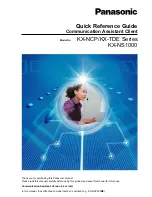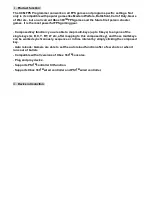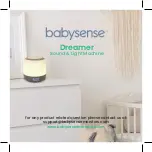
rates such as 96000Hz will cause certain features to be disabled, such as
Circle Surround II.
NOTE: Some features of the Sonica Theater may not be available at
higher sampling frequencies. For example, 96kHz playback is only
possible with two channels at a time; when playing back multi-
channel audio the sampling rate is lowered to 48kHz. This is due to
the bandwidth limitations of USB. If you experience problems when
playing audio at 96000Hz, try lowering the sampling rate to
48000Hz or 44100Hz.
To operate your Sonica Theater using the MME drivers and a music
program, follow the instructions in the previous section, then enable the
“M-Audio Sonica Theater Line” as your input and output device within
your music program’s audio setup page, and/or run your program’s audio
device profiling utility to analyze the new audio device in your system.
Enable Monitoring
- When this box is checked, the signal input into the
Line Input jack is routed directly to the Front Left and Right outputs.This
feature allows you to hear exactly what is going to be recorded, both
before recording is begun and during the actual recording process.
Many recording programs also have this feature, which may be labeled
“Auto Input Monitoring” or something similar. If your recording application
has Input Monitoring enabled, you should uncheck the Enable Monitoring
checkbox in the Sonica Theater control panel.
About Tab
This tab provides information about the software version of the control
panel, driver software and internal Sonica Theater firmware. This
information can be useful to customer support personnel when
troubleshooting problems with your Sonica Theater.
Sonica Theater Applications
Now that we’ve finished connecting speakers and setting levels, you’re
probably interested in getting started right away. This chapter should help
you through some typical uses of the Sonica Theater.
DVD Playback
The Sonica Theater will work with any software DVD player. The type of
signal your DVD player sends to the Sonica Theater is determined by the
26







































